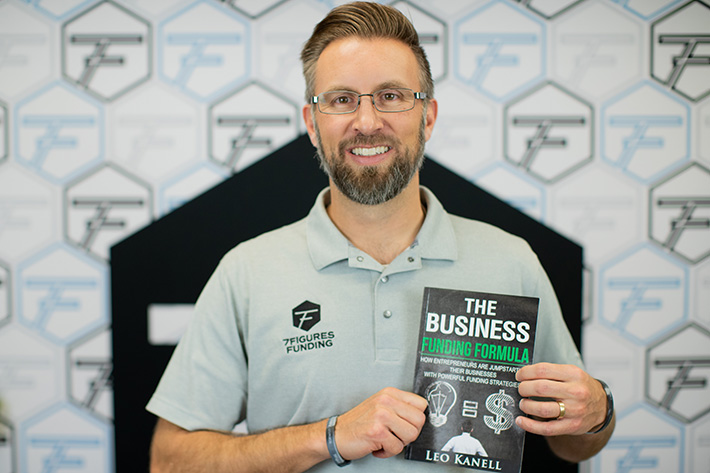sales
Monday through Fund-day
September 8, 2022 Nothing screams excitement like a brand-new week filled with endless funding opportunities. Regardless of the type of funding, the ultimate goal is to find clients in need of capital and spring to action quickly.
Nothing screams excitement like a brand-new week filled with endless funding opportunities. Regardless of the type of funding, the ultimate goal is to find clients in need of capital and spring to action quickly.
“I would say Tuesday is like, a day that things get done,” said Michael Krepak, CEO of FlexCap Solutions. “People always talk about Friday’s a closing day. I’ve had a lot of success on Fridays as just like a funding day, like when the deals actually get done afterwards in all the underwriting and the back and forth and stipulations. So, Tuesdays and Fridays…”
Fridays may be hectic for some professionals in the business who are trying to close out a deal before the weekend is over. The pressure to close a deal can create competition within oneself to finish the week off strong or to make sure that nothing ruins it over the weekend.
“There’s always a push to get everyone funded right before the weekend, you don’t want deals rolling over,” said Brendan P. Lynch, CEO at Sharpe Capital. “Too many things can happen: negative days, they can go negative, and then the login, they have to redo it. And you know, the deal can die on Monday. So, you always want to get everything done before the weekend. That’s for sure.”
For equipment finance consultant Cheryl Tibbs, if she is able to finish funding by Thursday, she uses Fridays to either spend quality time with loved ones or to promote her business.
“I’m a bit different than most. I start off strong on Mondays and relax on Friday,” said Tibbs. “When I’m done Thursday, late Thursday evening, Friday is reserved for deals that will fund that day. If I don’t have anything booked for a Friday funding, I usually chill on Fridays and use that for marketing or family time.”
Sonia Alvelo of Latin Financial was non-committal to a day. “What gets us excited is the satisfaction of a job well done…” Alvelo said.
Krepak meanwhile, explained that if you’re working on commission, then there is an incentive to keep going strong every day. “Like every day, you want to do something every day,” he said. “It’s just a competitive face to begin with.”
The Power of the Suit
August 15, 2022 Getting out of bed in the morning can be rough after a long night’s rest but jumping into your work outfit is like putting on a superhero cape to go out and save small businesses that need capital. Working in the finance industry, wardrobe is the last thing mentioned in regards to the job itself, but it is what allows many to put their best foot forward.
Getting out of bed in the morning can be rough after a long night’s rest but jumping into your work outfit is like putting on a superhero cape to go out and save small businesses that need capital. Working in the finance industry, wardrobe is the last thing mentioned in regards to the job itself, but it is what allows many to put their best foot forward.
“I come from a suit and tie background, it’s like a uniform,” said Mike Brooks, owner of Best Connect Capital. “So, when you’re a broker and you’re dealing with business owners, you’re holding a lot of weight, a lot of power in your hands, especially when you get a good client on the hook. So, I just feel that dressing appropriately whether it’s a suit and tie or work casual is absolutely essential.”
There’s a saying, Brooks continued, “When you look good you feel good.”
“I’m a woman, I like to dress up, it’s fun but most importantly we’re working in a male dominated industry,” said Angelina Fletcher, Director of Business Development at Wing Lake Capital. “A lot of the brokers and lenders that I work with have been in the industry for 20 plus years, they’ve already built their brand, I’m still building my brand. Walking into these events looking fresh and professional makes me feel good and confident so I can focus on networking.”
And when striving to close those business deals, having a special piece of clothing that gives one an extra push can dictate the confidence he/she possess throughout the day. Whether it’s a favorite tie or a favorite pair of shoes, there can be an item that sets the tone.
“My biggest thing is my Rolex watch, when you’re in situations it definitely gives you a sense of confidence,” said Brooks. “It’s a life milestone to be able to purchase a Rolex even if people are way past that point in their mind.”
It’s not so much about accessories, however, to Dr. Rev. R.J. Rochelle, Business Financial Planner & Exit Strategist. Rochelle starts his day off by being active.
“I’ll take a pre-workout,” Rochelle said. “Now that pre-workout gets me pumped, it’s better than coffee. And then I’ll go work out.”
On wardrobe, Rochelle said he finds it important to put his best foot forward when he’s out meeting potential clients in person and that the mindset comes more from starting off the day with music or a sales podcast.
“When I commute or when I’m about to go out to the field in particular to get pumped up, I may play like Commas by Future because we’re talking about making money,” Rochelle said.
Fletcher of Wing Lake also has a routine that gets her started.
“I meditate, I drink my coffee and I have liquid IV,” she said.
Whatever the routine or the gear, there’s a little magic to it all.
“if you’re like a medic or a police officer or you’re in the army and you’re wearing like clothes that don’t match up with what you’re doing… I’m sure [they’d] feel different,” said Brooks of Best Connect Capital.
Work With a Broker or Go Direct?
August 2, 2022“I believe that a merchant might be better off going to a broker so the broker can make available to the merchant several different offers,” said Pooja Nene, Broker Relations Manager at Balboa Capital. “And if they’re doing what they need to do correctly and if they’re really consulting the merchant correctly, I think that they would be providing the best offers to the merchant based on their needs.”
 It’s the age-old question, are merchants better served by using a broker or going direct? Opinions vary and are usually colored by what role one has in the process.
It’s the age-old question, are merchants better served by using a broker or going direct? Opinions vary and are usually colored by what role one has in the process.
“The advantages of working with a broker is it saves the merchants a lot of time, and in some cases saves them money in fees,” said Randy Guerrier, Senior Funding Executive at Banana Exchange, a company that provides capital to MCA providers. Guerrier’s vantage point makes him less biased. “A lot of brokers do have a lot of preexisting relationships and wholesale rates that they could get with their relationships,” he said.
Matthew Washington, Founder & CEO of Moneywell GRP, says there’s a bit more nuance to the whole thing.
“The reality is that when the merchants go direct with lenders, they’re essentially dealing with the lender’s broker shop, right?” he explained. “Any lender that gets directly contacted by a merchant usually gives them off to their sales team, which [is also able] to send [them] off to other lenders.”
Washington, whose company is a funder, was an advocate for what brokers can accomplish for their clients especially since he relies entirely on them for business. He emphasized that his company is one that doesn’t have a direct sales team to handle any direct inquiries.
“All my business comes from my ISO channel,” he explained. “So when I approve a deal, it’s up to me and the broker to win it if there’s competition, but if I declined the deal, my brokers take that deal to another lender that has an appetite for that particular scenario.”
 “[Lenders] may not have the staff available to form that relationship with a merchant,” said Pooja Nene of Balboa about the debate on broker vs. direct. She also cautioned that sidestepping a broker in the process might not translate into an increased likelihood of approval.
“[Lenders] may not have the staff available to form that relationship with a merchant,” said Pooja Nene of Balboa about the debate on broker vs. direct. She also cautioned that sidestepping a broker in the process might not translate into an increased likelihood of approval.
“If it’s the first round of funding, if it’s their first loan schedule, we don’t know who this merchant is, and we may feel a little bit more comfortable with that file coming through the broker and the broker discussing the terms with the merchant,” she said.
Guerrier of Banana Exchange said, “It always comes down to working with the right type of broker, right? It comes down to the person that answers the phone that’s working with you, whether it’s at a big company or small company, I like to look at things from the individual working with the right people.”
And finding the “right people” isn’t automatic because they still have to be found, and once they’re found the lender has to decide if the customer is also right for them. Speaking about that in relation to all the economic uncertainty, Washington of Moneywell GRP said that a funding company should stick to what they’re comfortable with and not “chase deals” that they wouldn’t normally fund.
“But, also [on being found], I would market the heck out of my company and make sure that everyone in the world knows what I do, my product line, my branding, my logo, and make sure that anyone that is looking for capital that they know ‘hey, this company is always popping up,’ and I’d make sure that I stand out,” Washington said.
After Funding Millions, Alt Financier Hosts Funding CEO Challenge
May 25, 2021 Leo Kanell, a funder from Utah, runs the 7 Day Funding CEO Challenge, a seven-day marathon video livestream of inspirational and educational funding content.
Leo Kanell, a funder from Utah, runs the 7 Day Funding CEO Challenge, a seven-day marathon video livestream of inspirational and educational funding content.
“So how [the challenge works] is basically, we’re looking for communities, and we’re building a community,” Kanell said. “Our focus is how can we help existing loan brokers, and then how can we help people who are looking for an additional stream of income that they can do from home obviously with the pandemic.”
All the action happens in a livestream on Facebook.
“Everybody kept asking ‘we need some training,’ so we built out a custom website for them so that they can build their funding empire from home,” Kanell said.
Many of the brand new market entrants are sales-minded individuals that are interested in working from home. Kanell has a sales mind and a small business funding background. He grew up in a family of nine from a small town in Utah with a population of only 3,000. He knew he would be a salesman when he turned a summer painting business internship into a $60,000 operation. After college, he tried his hand at real estate, but after 2008 he started looking for another industry.
“I started and went ‘Well, I’m gonna need money for that business,'” Kanell said. “I started looking at the different options to get financing for that next business venture, and it was very difficult, especially for a new business, especially if you’re a pre-revenue business or you don’t have a lot of sales and or collateral.”
He realized SMB funding was the business he should be getting into so he jumped in with both feet. From there he veered into a business education program alongside products like business credit cards.
He soon said that he was doing well, but he heard the funding industry calling his name. “Everything pulled me back into funding,” Kanell said and he decided to combine his education system toward loan broker training programs. He said many brokers don’t realize startups and pre-revenue bushiness can qualify for 0% for up to 15 months.
Now, Kanell hosts an industry podcast that features financial industry guests, and alongside funding, he looks forward to building a community of broker and funder education services.
“We’re going to not only get you the best funding guaranteed, but we’re going to educate you and empower you along the way,” Kanell said. “They can work as direct funders and keep 100% of the commission, and that if they want us to do the work you know, we can do splits.”
Selling Finance Door-to-Door During Covid
April 9, 2021 This week, lockdown returned to Ontario, Canada, due to the third wave of Covid cases. On April 3rd, the Premier issued a stay-at-home order, putting 14 million Canadians back behind closed doors. Based in Ontario, Canadian Financial is a one-stop alternative and traditional funding shop that still champions door-to-door sales and the lockdown has sidelined them for the third time.
This week, lockdown returned to Ontario, Canada, due to the third wave of Covid cases. On April 3rd, the Premier issued a stay-at-home order, putting 14 million Canadians back behind closed doors. Based in Ontario, Canadian Financial is a one-stop alternative and traditional funding shop that still champions door-to-door sales and the lockdown has sidelined them for the third time.
“We just went back into lockdown. The whole province, everything just shut down,” CEO Patrick Labreche said. “We were getting 20 to 30 new cases a day, and then it jumped to like 200 a day.”
Meanwhile, 110 miles down south at deBanked, de Blasio announced NYC public beaches would be opening up by Memorial Day. Because of the wide range of government shutdowns this past year, Labreche said it is hard to admit to some that his business is booming.
“I was having a conversation with a guy who does payment processing, he makes residuals on his customers, and so his book of business was not making any money right now; he’s hurting,” Labreche said. “So it’s kind of hard to tell a guy like that that we’re flourishing, and maybe you should come work with us.”
Labreche said that the processor was actually going to work with Canadian Financial. Success this past year came from leveraging the interpersonal skills that make an excellent door-to-door salesperson thrive, Labreche said.
 “I started in the door-to-door and b2b at 19 years old, completely broke. I dropped out of school, and I started knocking on doors, and you know, that business model has changed my entire life,” Labreche said. “When you get into door-to-door sales, you understand how to sell yourself first. You get a sense of how to communicate with people, how to understand their needs, their pain points: How to leverage the service or product that you have.”
“I started in the door-to-door and b2b at 19 years old, completely broke. I dropped out of school, and I started knocking on doors, and you know, that business model has changed my entire life,” Labreche said. “When you get into door-to-door sales, you understand how to sell yourself first. You get a sense of how to communicate with people, how to understand their needs, their pain points: How to leverage the service or product that you have.”
With a team of salespeople connected through weekly department meetings and messaging groups to keep the energy up, the deals kept rolling in throughout covid. Labreche said his firm is set apart from a good portion of Canadian alt finance: they offer a smorgasbord of financial products directly to the borrower instead of using lead generators.
While most fintechs think all business owners want a one-button final product, Labreche attests to the opposite- his firm sends out salespeople to make sure businesses know they have a rep to rely on.
“I have nothing bad to say about aggregators; that’s their business model, not ours,” Labreche said. “Our business model is going into a business that didn’t even know that the solution was available. When you’re looking online, you’re looking for a solution that you already know is available.”
Labreche favors traditional finance. His firm offers MCAs and other alternative forms of funding but said those are mostly band-aid solutions and he regularly sees MCA deals taking advantage of merchants. For example, Labreche said he walked into an ESCO gas station last month, and through talking to the owner, discovered an opportunity. The owner had taken an MCA from a big Canadian firm but was confused about the cost of capital- he thought he was paying 17%, but Labreche read a recent statement and discovered the rate was really 50%.
“Right there and then he was like, ‘oh my God, that’s crazy I didn’t know,’ he was misled, and it’s like that across the board. So I ended up getting him a quarter-million dollars at four and a half percent on a term loan,” Labreche said. “Nobody’s ever walked into his business or called him, offering him traditional money. We feel like there’s a huge underserved, undereducated market.”
This week, walk-ins have become less of a possibility, with a lockdown banning all non-essential travel. Still, business development manager Julian Hulan looked forward to when things would open back up. He had masked up and gone out on sales calls throughout the year when the government wasn’t in shutdown mode. Recently he traveled to 20 car dealerships to offer financing in a two-day period and said he found merchants excited to see him in person instead of over email.
“They were like ‘oh, I can actually sit down and talk to this guy?’ and that’s when they eat it up,” Hulan said. “They know because they’ve already made that connection face to face, they can call me directly. We don’t do this whole 1-800 Number. You’re going to call me directly and if I don’t answer, you leave me a voicemail, I call you back, it’s that personal relationship between me and that client.”
Consultative Selling in Small Business Finance
October 16, 2019
 It’s nearly impossible to teach fiscal responsibility to most consumers, according to researchers at universities and nonprofit agencies. But alternative small-business funders and brokers often manage to steer clients toward financial prudence, and imparting pecuniary knowledge can become part of a consultative approach to selling.
It’s nearly impossible to teach fiscal responsibility to most consumers, according to researchers at universities and nonprofit agencies. But alternative small-business funders and brokers often manage to steer clients toward financial prudence, and imparting pecuniary knowledge can become part of a consultative approach to selling.
Still, nobody says it’s easy to convince the public or merchants to handle cash, credit and debt wisely and responsibly. Consider the consumer research cited by Mariel Beasley, principal at the Center for Advanced Hindsight at Duke University and co-director of the Common Cents Lab, which works to improve the financial behavior of low- and moderate-income households.
“For the last 30 years in the U.S. there has been a huge emphasis on increasing financial education, financial literacy,” Beasley says. But it hasn’t really worked. “Content-based financial education classes only accounted for .1 percent variation in financial behavior,” she continues. “We like to joke that it’s not zero but it’s very, very close.” And that’s the average. Online and classroom financial education influences lower-income people even less.
The problem stems from trying to teach financial responsibility too late in life, says Noah Grayson, president and founder of Norwalk, Conn.-based South End Capital. He advocates introducing young people to finance at the same time they’re learning history, algebra and other standard subjects in school.
Yet Grayson and others contend that it’s never too late for motivated entrepreneurs to pick up the basics. Even novice small-business owners tend to possess a little more financial acumen than the average person, they say. That makes entrepreneurs easier to teach than the general public but still in need of coaching in the basics of handling money.
Take the example of a shopkeeper who grabs an offer of $50,000 with no idea how he’ll use the funds to grow the business or how he’ll pay the money back, suggests Cheryl Tibbs, general manager of One Stop Commercial Capital, Douglasville, Ga. “The easy access to credit blinds a lot of merchants,” she notes.
 Entrepreneurs often make bad decisions simply because they don’t have a background in business, according to Jared Weitz, CEO of New York based United Capital Source. “Many of the people who come to us are trying their hardest,” he observes.
Entrepreneurs often make bad decisions simply because they don’t have a background in business, according to Jared Weitz, CEO of New York based United Capital Source. “Many of the people who come to us are trying their hardest,” he observes.
Weitz offers the example of his own close relative who’s a veterinarian. That profession attracts some of the brainiest high-school valedictorians but doesn’t mean they know business. “He’s the best doctor ever and he’s not a great businessman because he doesn’t think about those things first. What he thinks about is helping people. That’s why he got into his profession.”
Entrepreneurs often devote themselves to a vision that isn’t businesses-oriented. “They start a business because they have a great idea or a great product, and that’s what excites them,” Grayson says. “They jump in with both feet and don’t think much about the business side.” The business side isn’t as much fun.
Merchants also attend to so many aspects of an enterprise—everything from sales, production and distribution to hiring, payroll and training—that they can’t afford to devote too much time to any single facet, notes Joe Fiorella, principal at Kansas City, Mo.-based Central Funding. Business owners respond to what’s most urgent, not necessarily what’s most important.
For whatever reason, some business owners spiral downward into financial ruin, bouncing checks, stacking merchant cash advances and continually seeking yet another merchant cash advance to bail them out of a precarious situation, says Jeremy Brown, chairman of Bethesda, Md.-based Rapid Advance.

Weitz advises sitting down with those clients and coming to an understanding of the situation. In some cases, enough cash might be coming in but the incoming autopayments aren’t timed to cover the outgoing autopayments, he says by way of example.
Informing clients of such problems makes a demonstrable difference. “We can see that it works because we have clients renewing with us,” says Weitz. “We’re able to swim them upstream to different products” as their finances gradually improve, he says.
The products in that stream begin with relatively higher-cost vehicles like merchant cash advances and proceed to other less-expensive instruments with better terms, says Brown. Those include term loans, Small Business Administration loans, equipment leasing, receivables factoring and, ultimately the goal for any well-capitalized small business—a relationship with the local bank.
Failing to consider those options and instead simply abetting stackers to make a quick buck can give the industry a “black eye,” and it benefits none of the parties involved, Tibbs observes. But merchants deserve as much blame as funders and brokers, she maintains.
Prospective clients who stack MCAs, don’t care about their credit rating and simply want to staunch their financial bleeding probably account for 35 percent to 40 percent of the applicants Tibbs encounters, she says.
Just the same, alt-funders continue to urge clients to hire accountants, consult attorneys, employ helpful software, shore up credit ratings, keep tabs on cash flow, calculate margins, improve distribution chains and outline plans for growth. It’s what helps the industry rise above the “get-money quick” image that it’s outgrowing, Weitz, says. Many funders and brokers consider providing financial advice an essential aspect of consultative selling. It’s an approach that begins with making sure applicants understand the debt they’re taking on, the terms of the payback and how their businesses will benefit from the influx of capital. It continues with a commitment to helping clients not just with funding but also with other types of business consultation.
“It’s not so much selling as building a rapport with clients—serving as a strategic advisor or financial resource for them, identifying their needs and directing them to the right loan product to meet those needs,” says Grayson. “They should feel they can call you about anything specific to their business, not just their loan requests.” He also cautions against providing information the client will not absorb or will find offensive.
Justin Bakes, CEO of Boston-based Forward Financing also advocates consultative selling. “It’s all about questions and getting information on what’s driving the business owner,” he says. “It’s a process.”
Consultative sales hinges on knowing the customer, agrees Jason Solomon, Forward Financing vice president of sales. “Businesses are never similar in the mind of the business owner,” he notes. “To effectively structure a program best-suited to the merchant’s long-time business needs and set a proper path forward to better and better financial products, you need to know who the business owner is and what his long term goals are.”
“It’s taking an approach of actually being a consultant as opposed to a $7 an hour order taker,” Tibbs says of consultative selling. “I like to teach new reps to think of it as if you were a doctor. Doctors ask questions to arrive at a final diagnosis. So if you’re asking your prospective customer questions about their business, about their cash flow, about their intentions of how they’re planning to get back on track.”
Learning about the clients’ business helps brokers recommend the least-expensive funding instrument, Tibbs says. “I really hate to see someone with a 700 credit score come in to get a merchant cash advance,” she maintains. The consultative approach requires knowing the funding products, knowing how to listen to the customer and combining those two elements to make an informed decision on which product to recommend, she notes.
 Consultative sales can greatly benefit clients, Weitz maintains. If a pizzeria proprietor asks for an expensive $50,000 cash advance to buy a new oven, a responsible broker may find the applicant qualifies for an equipment loan with single-digit interest and monthly payments over a five-year period that puts less pressure on daily cash flow.
Consultative sales can greatly benefit clients, Weitz maintains. If a pizzeria proprietor asks for an expensive $50,000 cash advance to buy a new oven, a responsible broker may find the applicant qualifies for an equipment loan with single-digit interest and monthly payments over a five-year period that puts less pressure on daily cash flow.
It’s also about pointing out errors. Brokers and funders see common mistakes when they look at tax returns and financial records, says Brown. “The biggest issue is that small-business owners—because they work so hard— make a profit of X amount of money and then take that out of the business,” he notes. Instead, he advises reinvesting a portion of those funds so that they can build equity in the business and avoid the need to seek outside capital at high rates.
Another common error occurs when entrepreneurs take a short-term approach to their businesses instead of making longer-term plans, Brown says. That longer-term vision includes learning what it takes to improve their businesses enough to qualify for lower-cost financing.
Sometimes, small merchants also make the mistake of blending their personal finances and their business dealings. Some do it out of necessity because they’re launching an enterprise on their personal credit cards, and others act of ignorance. “They don’t necessarily know they’re doing something wrong,” Grayson observes. “There are tax ramifications.”
Some just don’t look at their businesses objectively. Take the example of a company that approached Central Funding for capital to buy inventory in Asia. Fiorella studied the numbers and then informed the merchant that it wasn’t a money problem—it was a margins problem. “You could sell three times what you’re wanting to buy, and you still won’t get to where you want to be,” he reports telling the potential customer.
Consultative selling also means establishing a long-term relationship. Forward Financing uses technology to keep in contact with clients regularly, not just when clients need capital, Bakes notes. That cultivates long-lasting relationships and shows the company cares. As the relationship matures it becomes easier to maintain because the customers want to talk to the company. “They’re running to pick up the phone.”
The conversations that don’t hinge on funding usually center on Forward Financing learning more about the customer’s business, says Solomon. That include the client’s needs and how they’ve used the capital they’ve received.
“We have our own internal cadence and guidelines for when we reach out and how often and what happens,” says Solomon. Customer relationship management technology provides triggers when it’s time for the sales team or the account-servicing team to contact clients by phone or email.
Do small-business owners take advice on their finances? Some need a steady infusion of capital at increasingly higher cost and simply won’t heed the best tips, says Solomon. “It’s certainly a mix,” he says. “Not everybody is going to listen.”
Paradoxically, the business owners most open to advice already have the best-run companies, says Fiorella. Those who are closed to counseling often need it the most, he declares.
Moreover, not everybody is taking the consultative approach. “New brokers are so excited to get a commission check they throw the consultative approach out the window,” Tibbs says.
Yet many alt-funders bring consultative experience from other professions into their work with providing funds to small business. Tibbs, for example, previously helped home buyers find the best mortgage.
Consultative selling came naturally to Central Funding because the company started as a business and analytics consultancy called Blue Sea Services and then transformed itself into an alternative funding firm, says Fiorella. Central Funding reviews clients’ financial statements and operations between rounds of funding, he notes.
Consultations with borrowers reach an especially deep level at PledgeCap, a Long Island-based asset-based lender, because clients who default have to forfeit the valuables they put up as collateral—anything from a yacht to a bulldozer—says Gene Ayzenberg, PledgeCap’s chief operating officer. Conversations cover the value of the assets and the risk of losing them as well as the reasons for seeking capital, he notes.
No matter how salespeople arrive at their belief in the consultative approach, they last much longer in the business than their competitors who are merely seeking a quick payoff, Tibbs says. Others contend that it’s clearly the best way to operate these days.
“The consultative approach is the only one that works,” says Weitz. “Today, everything is about the customer experience. People are making more-educated, better informed decisions.” What’s more, with the consultative approach clients just keep getting smarter, he adds.
The days of the hard sell have ended, Grayson agrees. Customers have access to information on the internet, and brokers and funders can prosper by helping customers, he says. “Our compensation doesn’t vary much depending upon which product we put a client in so we can dig deeper into what will fit the client without thinking about what the economic benefit will be to us.”
Even though the public has become familiar with alternative financing in general, most haven’t learned the nuances. That’s where consultative selling can help by outlining the differing products now available for businesses with nearly any type of credit-worthiness. “It’s for everybody,” Weitz says of today’s alternative small business funding, “not just a bank turn-down.”
Do You Need a Mentor?
June 11, 2019 “You don’t need a f-ing mentor,” is the opening line of a short online video delivered to camera by Gary Vaynerchuk, the celebrated high energy marketing and sales guru. In the video, he concludes by saying: “Enough with the mentor horseshit. Go f-ing execute. There’s unlimited free mentors on f-ing YouTube. Go f-ing work.”
“You don’t need a f-ing mentor,” is the opening line of a short online video delivered to camera by Gary Vaynerchuk, the celebrated high energy marketing and sales guru. In the video, he concludes by saying: “Enough with the mentor horseshit. Go f-ing execute. There’s unlimited free mentors on f-ing YouTube. Go f-ing work.”
A discussion with industry insiders suggests that Vaynerchuk’s sentiment is somewhat controversial.
“Without mentorships, I wouldn’t be able to be where I am now,” said Josh Feinberg, co-founder of New Hampshire-based Everlasting Capital, a brokerage that has twice made it onto the Inc. 500/5000 list of the fastest growing U.S. companies, ranked #323 in 2017.
“Mentorship doesn’t just mean asking people for advice,” Feinberg said. “It means being able to build relationships with people who are on a greater level.”
For instance, Feinberg said that he and co-founder of BFS Capital, Cathy Bass, would speak about how she and others grew BFS, how they go to market and what is most important to them.
“And I was able to implement some of that into my own company,” Feinberg said.
Joe Cohen, who runs Business Finance Advance, a brokerage in Brooklyn, said he has mentored dozens of people, mostly his employees, throughout his career.
“You have to instill a solid work ethic,” Cohen said. “And you have to lead by example. Not by dictating, ‘You do this.’”
As for Vaynerchuk’s assertion that there are “unlimited free mentors on YouTube,” David Korchak, Managing Member of Primary Capital, a funder in Brooklyn, makes a clear distinction between a social media celebrity and a mentor.
 “I don’t understand how anyone can say they have a mentor in someone with two million followers on Instagram,” Korchak said. “What did this person do for you? Maybe he helped you get to the gym in the morning…but that’s inspiration, that’s not mentorship. That’s the difference between someone posting a video on Instagram and someone sitting down with you at a desk and showing you ‘This is where you made a mistake. This is how you can make sure you don’t do that again, and this is how you can make it better for the future.’ That’s not inspiration, that’s guidance. And a mentor is a guide for you.”
“I don’t understand how anyone can say they have a mentor in someone with two million followers on Instagram,” Korchak said. “What did this person do for you? Maybe he helped you get to the gym in the morning…but that’s inspiration, that’s not mentorship. That’s the difference between someone posting a video on Instagram and someone sitting down with you at a desk and showing you ‘This is where you made a mistake. This is how you can make sure you don’t do that again, and this is how you can make it better for the future.’ That’s not inspiration, that’s guidance. And a mentor is a guide for you.”
But Chad Otar, a veteran MCA broker in New York, said that he agrees with what Vaynerchuk was trying to communicate in his video
“You can have a mentor,” Otar said. “But at the end of the day, you have to put your blood, sweat and grit into it. A mentor can only do so much.”
When asked if Otar has a mentor, he said it’s his brother, who introduced him to the MCA industry. This leads to the question of who can or ought to be one’s mentor?
“A mentor can be anyone in the industry who’s been there before,” Cohen said. “Someone who can tell you what’s going to happen if you do this and what’s going to happen if you do that.”
Cohen said that when he started out in sales years ago, his mentors were older colleagues of his on the sales floor.
“I saw in them commitment to the job and how they worked diligently to make every deal happen,” Cohen said. “They never gave up.”
Some ISO owners even pay to train their managers to be excellent mentors to their salespeople, like Edward Deangelis, founder of the fast-growing Pennsylvania-based brokerage, Amerifi.
Deangelis said that he has used Sandler Training for the last seven years, both for himself and his team. His managers go to Sandler Training’s management boot camps once or twice a month for 3 to 4 hours.
“They learn skill sets on how to be an excellent sales manager,” Deangelis said. “How to cultivate your team rather than just be a boss. And to really ask [their] salespeople what they’re struggling with.”
Deangelis also has a CEO coach that comes to the office once a month for him. He said that the coaching has helped him in many ways, including in his personal life.
Feinberg said that you really have to choose your mentors carefully because a lot of people can talk themselves up into being something they’re not. And he said that one person in the business who said he would guide Feinberg in the right direction ended up stealing his deals by the end of the relationship.
“Look at media exposure,” Feinberg suggested. “If they seem big but you can’t find them in the news or you haven’t seen proof, it’s probably not someone to take advice from.”
Closers: Drink Up to 25 Cups of Coffee Per Day
June 3, 2019 Drink up closers! Research led by Professor Steffen Petersen from Queen Mary’s William Harvey Research Institute suggests that drinking coffee is not that bad for your heart.
Drink up closers! Research led by Professor Steffen Petersen from Queen Mary’s William Harvey Research Institute suggests that drinking coffee is not that bad for your heart.
The study examined more than 8,000 people across three groups of coffee drinkers, those drinking less than 1 cup per day, those drinking 1-3 cups per day, and those drinking more than 3 cups per day. Those surveyed in the 3rd group drank an average of 5 cups of coffee per day but multiple people reported drinking as much as 25 cups per day (or even more!). Even for them, “no increased stiffening of arteries was associated with those who drank up to this high limit when compared with those who drank less than one cup a day,” the report said.
Wow!
Although the report did not reveal the identities of those surveyed, deBanked suspects the individuals drinking 25 cups of coffee per day are sales closers. For one, these individuals clearly did not put the coffee down.
Dr Kenneth Fung, who led the data analysis for the research at Queen Mary University of London, said “Whilst we can’t prove a causal link in this study, our research indicates coffee isn’t as bad for the arteries as previous studies would suggest.”





























